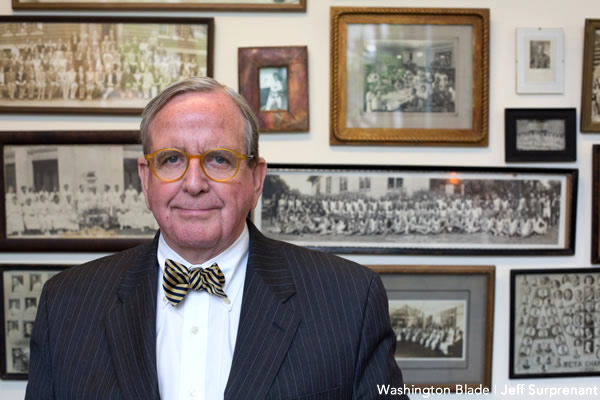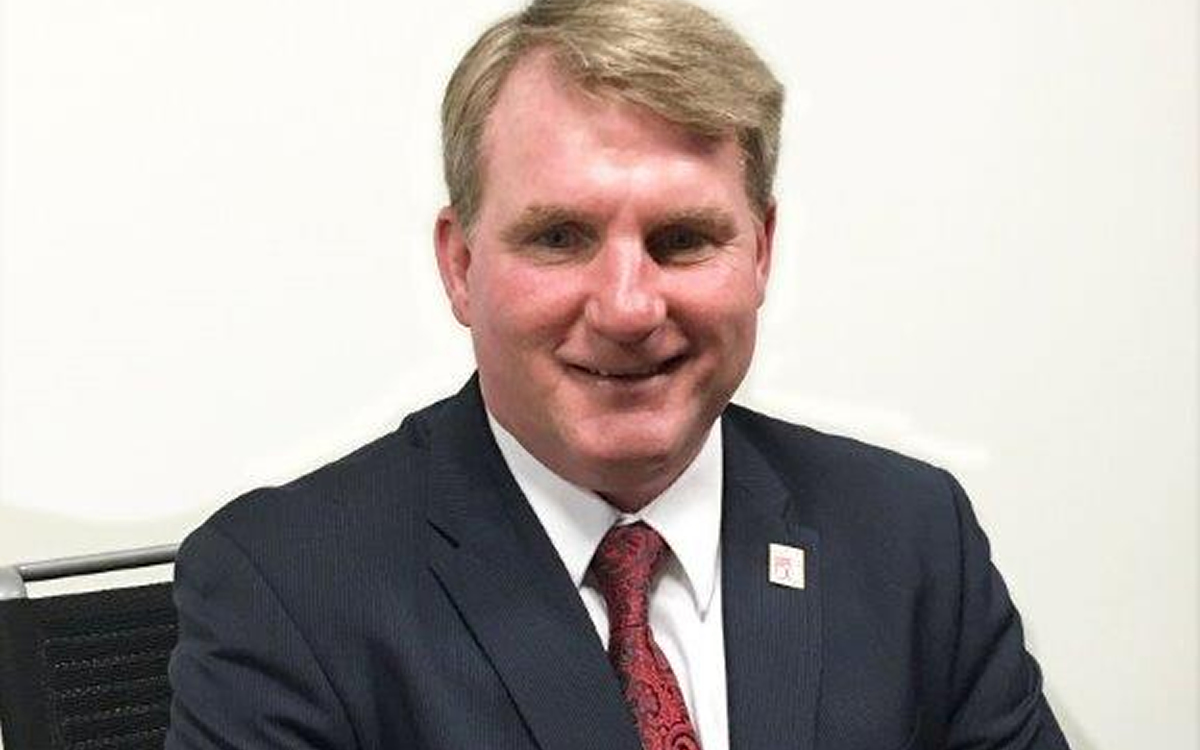Local
Graham to run for fifth term
Gay D.C. Council member announces re-election bid


Gay D.C. Councilmember Jim Graham (D-Ward 1) announced his re-election bid on Bruce DePuyt’s show Monday. (Washington Blade file photo by Jeff Surprenant)
Gay D.C. Councilmember Jim Graham (D-Ward 1) announced on Monday that he will run in the April 1, 2014 Democratic primary for a fifth term in office.
Graham made the announcement on the News Channel 8 TV program Bruce DePuyt Live a little more than a month after he formed an exploratory committee to help him decide whether or not to run for re-election.
In a statement released at the time of the announcement, Graham said that in discussions with Ward 1 residents he was reminded of the major economic development he helped bring about in all parts of the ward and his work in making sure the development benefited the residents. He also pointed to his constituent service work that he noted has been praised as among the best on the Council.
“It came down to, Jim, do you want to serve another four years? Graham told DePuyt. “Is this really something you want to do? Do you want to be of service? And the answer I came up with is yes.”
As of Dec. 6, three others had filed papers to run in the Democratic primary for the Ward 1 Council seat, according to a candidate list provided by the D.C. Board of Elections and Ethics. All candidates must submit the required number of petition signatures by Jan. 2 to qualify for placement on the ballot.
The three running against Graham are longtime community activist and former Advisory Neighborhood Commissioner Bryan Weaver; public relations consultant and community activist Brianne Nadeau; and Carnegie Mellon University professor Beverly Wheeler, who is a former chief of staff for D.C. Council Chair Phil Mendelson (D-At-Large) before Mendelson became chair.
Graham, 68, has been among the Council’s strongest advocates for LGBT rights and people with HIV/AIDS. Prior to winning election to the Council, Graham served for more than 15 years as executive director of the Whitman-Walker Clinic, the city’s largest private, non-profit organization providing services to people with HIV/AIDS.
Graham’s three opponents have expressed support for LGBT equality.
Weaver, who ran and lost to Graham in the 2010 Democratic primary, has been the most outspoken this year among the three candidates challenging Graham on the issue of ethics. In a statement released Monday immediately after Graham announced he was running for re-election Weaver raised the issue of the Council’s decision in February of this year to reprimand Graham over an allegation that he improperly intervened in the negotiating process for a city contract with a developer.
“The Councilmember’s decision to seek re-election reflects just how out of touch he has become about the importance of the public’s trust in our government,” Weaver said.
The Council voted 11-2 to issue the reprimand after the city’s newly created independent ethics board ruled that Graham, while not violating any law, breached a code of ethics as a Council member by intervening in the contract process.
Graham has strongly disputed the claim that he acted improperly. He has said he favored one developer over another for a Metro-related project in his ward based on the belief that the company he favored was better qualified to do the work.
Political observers have said the reprimand by his Council colleagues and the ethics board ruling would likely make the outcome of Graham’s re-election closer than it has been in Graham’s four previous elections, in which he won by significant margins. In the 2010 general election, Graham won with 81 percent of the vote.
Ward 1 ANC Commissioner Marc Morgan, who ran against Graham as a Republican in the 2010 general election, said Graham remains highly popular among many Ward 1 residents based on his years of constituent service work in support of many of the ward’s diverse neighborhoods.
“In trying to put political bias aside, I must admit I’m a fan of Jim Graham,” Morgan told the Blade. “I can tell you that in my area the residents are extremely satisfied with him.”
The Gertrude Stein Democratic Club, the city’s largest LGBT political organization, has endorsed Graham in each of his past races for the Ward 1 Council seat. But this time Weaver, who is viewed as a longtime friend of the LGBT community, is expected to compete for the Stein Club endorsement.
Stein Club officials said they have yet to develop a timetable for making endorsements in the April 1 primary, but said an endorsement meeting and forum for Council candidates would likely take place in February or March.
District of Columbia
Taste of Point returns at critical time for queer students
BIPOC scholar to speak at Room & Board event on May 2

The Point Foundation will kick off May with its annual Taste of Point DC event. The event will be hosted at Room & Board on 14th Street and feature a silent auction, food tastings, a speech from a scholar, and more.
Point’s chief of staff, Kevin Wright, said that at Taste of Point, the scholars are the star of the show.
“People never come to an event to hear Point staff speak, they come to hear from the people most impacted by the program,” he said. “At its core Taste of Point is designed to center and highlight our scholars’ voices and experiences.”
This year, a Point BIPOC Scholar, Katherine Guerrero Rivera will speak at the event.
“It is a great opportunity to highlight the scholars out there on the front lines making impacts in almost every sector and job field,” Wright said.
Wright pointed out that this year especially is a pivotal time for LGBTQ students.
“In 2023, there were 20 states that passed anti-LGBTQ legislation,” he said. “By this point in [2024] we already have more.”
Wright said the impacts of those legislative attacks are far reaching and that Point is continuously monitoring the impact they have on students on the ground.
Last month, The Washington Post reported that states with anti-LGBTQ laws in place saw school hate crimes quadruple. This report came a month after a non-binary student, Nex Bennedict, died after being attacked at school.
“So, we see this as a critical moment to really step up and help students who are facing these challenges on their campus,” Wright said. “Our mission is to continue to empower our scholars to achieve their full academic and leadership potential.”
This year Point awarded nearly 600 LGBTQ students with scholarships. These include the flagship scholarship, community college scholarship and the BIPOC scholarship. When the foundation started in 2002, there were only eight scholarships awarded.
Dr. Harjant Gill is one of those scholars who said the scholarship was pivotal for him. Gill said he spent his undergraduate years creating films and doing activism for the LGBTQ community.
As a result, his academic record wasn’t stellar and although he was admitted into American University’s graduate program he had no clue how he would fund it.
Upon arrival to American he was told to apply for a Point scholarship and the rest was history.
“It ended up being the one thing that kept me going otherwise I would have dropped out,” he said. “Point was incredibly instrumental in my journey to becoming an academic and a professor.”
More than a decade later, Gill serves on the host committee for Taste of Point and is a mentor to young Point scholars. He said that he donates money yearly to Point and that when he is asked what he wants for a gift he will often tell his friends to donate too.
To attend the event on Wednesday, May 2, purchase tickets at the Point website. If you can’t attend this year’s Taste of Point DC event but would like to get involved, you can also donate online.
District of Columbia
Three of five LGBTQ candidates win race for DNC delegate from D.C.
32 candidates competed for 13 elected seats in party caucus

Three out of five known LGBTQ candidates running for election as delegates from D.C. to the Democratic National Convention won their races at an April 20 Democratic Party caucus election held at D.C.’s Walter Washington Convention Center.
Ward 2 gay Democratic activist John Fanning finished in first place with 140 votes and Ward 8 gay Democratic activist David Meadows finished in second place with 127 votes in a race in which six male candidates committed to supporting President Biden were competing for three male seats in a section of the city designated as Congressional District 1, which included registered Democratic voters in Wards 1, 2, 6, and 8.
Ward 7 gay Democratic activist Jimmie Williams won his race, finishing in third place with 200 votes in a race in which eight male candidates committed to President Biden competed for four male seats in the Congressional District 2 section of the city that included Wards 3, 4, 5, and 7.
Gay Democratic activist Felipe Afanador lost his race, finishing in sixth place with 47 votes in the Congressional District 2 election for male candidates backing Biden. It couldn’t immediately be determined which of the four wards in District 2 he is from.
The Washington Blade didn’t learn about Afanador’s status as an LGBTQ candidate until the Capital Stonewall Democrats announced it one day before the April 20 party election in an email statement.
In the Congressional District 2 race among female candidates, in which eight candidates competed for three female seats, transgender rights advocate and Ward 3 Democratic Party activist Monika Nemeth lost her race, finishing in sixth place with 49 votes.
The five LGBTQ candidates were among 32 candidates competing for just 13 elected delegate positions in D.C. D.C. will have a total of 51 delegates to the Democratic Convention, but the other 38 include elected officials and party leaders who are considered “automatic” or appointed delegates. The Democratic Convention will be held in Chicago Aug. 19-23.
Observers familiar with the April 20 party caucus election said Fanning, Meadows, and Williams had participated in local D.C. Democratic Party events and activities for a longer period than Nemeth and Afanador and appear to have been better known among Democratic voters in their respective wards as well as other wards. Those factors contributed to their receiving significantly more votes than most other candidates, observers have said.
In his candidacy statement posted on the D.C. Democratic Party website, Afanador said he worked on the 2020 Biden presidential election campaign in Pennsylvania. His LinkedIn page says in 2022 he began work in Washington for the Biden administration as an official in the U.S. Department of Agriculture.
Nemeth is a past president of D.C.’s Capital Stonewall Democrats, the city’s largest LGBTQ local political group, and has been an active member of the D.C. Democratic State Committee, the local party governing body. She served as a Biden delegate at the 2020 Democratic National Convention.
“It is important for our D.C. delegation to have strong LGBTQ representation,” Capital Stonewall Democrats said in its April 19 statement. “There are five LGBQ candidates running to be delegate, and Capital Stonewall Democrats asks that our members support each one,” the statement says.
“Unfortunately, they fell short, but they and all queer Democrats are welcome to attend and participate in convention events and activities sponsored by the national and local party,” Meadows told the Blade in referring to Nemeth and Afanador. “Our shared goal is to unite behind the Biden-Harris ticket to protect our LGBTQ rights from being dismantled by Donald Trump and the GOP,” Meadows said.
“Running for District Delegate is one of the most grassroots efforts,” Fanning told the Blade. “It’s very beneficial to align yourself on a slate with community leaders that have either previously run for District Delegate or have developed a constituency in their community from other civic engagements,” he said, referring to possible reasons for his, Meadows, and Williams’s election victory.
Aside from the D.C. elected LGBTQ delegates, two prominent D.C. LGBTQ Democratic leaders will be appointed as delegates to the 2024 Democratic National Convention in their role as members of the Democratic National Committee from D.C. They are Claire Lucas, a highly acclaimed Democratic Party and LGBTQ rights advocate and party fundraiser; and Earl Fowlkes, one of the lead organizers of D.C.’s annual Black LGBTQ Pride celebration and former president of the Capital Stonewall Democrats. Both are committed to supporting President Biden as the Democratic nominee for re-election.

GAITHERSBURG, Md. — Maryland state Del. Joe Vogel (D-Montgomery County) on Friday held a “Big Gay Canvass Kickoff” event at his congressional campaign’s headquarters.
LGBTQ+ Victory Fund Vice President of Outreach and Engagement Marty Rouse and John Klenert, a member of the DC Vote and Victory Fund Campaign board of directors, are among those who participated alongside members of Equality PAC. Vogel spoke before Rouse, Klenert and others canvassed for votes in the area.
“Joe brings a fresh new perspective to politics,” said Gabri Kurtzer-Ellenbogen, deputy field director for Vogel’s campaign.
Vogel, 27, is among the Democrats running for Congressman David Trone’s seat.
Trone last May announced his bid to succeed retiring U.S. Sen. Ben Cardin (D-Md.) in the U.S. Senate.
The Democratic primary is on May 14. Vogel would be the first Latino, the first gay man and first Gen Zer elected to Congress from Maryland if he were to win in November.
“We need a new generation of leadership with new perspectives, new ideas, and the courage to actually deliver for our communities if we want things to get better in this country,” Vogel told the Washington Blade last month during an interview in D.C.
-

 South America4 days ago
South America4 days agoDaniel Zamudio murderer’s parole request denied
-

 Maryland5 days ago
Maryland5 days agoMontgomery County police chief discusses arrest of trans student charged with planned school shooting
-

 Commentary5 days ago
Commentary5 days agoWorld ‘isn’t much different today’
-

 State Department18 hours ago
State Department18 hours agoState Department releases annual human rights report











